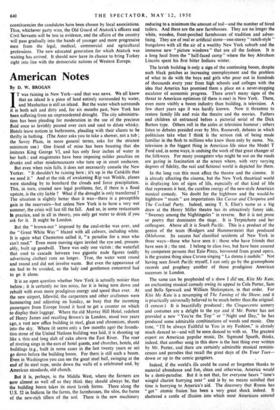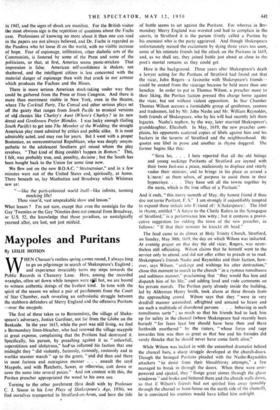American Notes
By D. W. BROGAN
IT was raining in New York—and that was news. We all know that an island Is a piece of land entirely surrounded by water,
and Manhattan is still an island. But the water which surrounds it is both salt and dirty and, for six months past, New York has been suffering from an unprecedented drought. The city administra- tion has been pleading for moderation in the use Of the precious fluid once so lavishly poured over cars and used to dilute whisky. Hotels leave notices in bathrooms, pleading with their clients to be thrifty in bathing. (The Astor asks you to take a shower, not a tub ; the Savoy Plaza, in more general terms, asks for the strictest minimum use.) One friend of mine has been boasting that she imitates King George VI, and has only four inches of water in her bath ; and magistrates have been imposing milder penalties on drunks and other misdemeanants who turn up in court unshaven.
But even when rain falls, it does not necessarily console the New Yorker. " It shouldn't be raining here ; it's up in the Catskills that we need it." And at the risk of awakening Rip van Winkle, planes were standing by to bombard the clouds and force precipitation. This, in turn, created new legal problems, for, if there is a flood upstate, is the city liable ? What if the drought is only transferred ? The situation is slightly better than it was—there is a perceptible gain in the reservoirs—but unless New York is to have a very wet summer, the crisis will last till the fall. And so, in some restaurants in practice, and in all in theory, you only get water to drink if you ask for it. It might be London.
But the " brown-out " imposed by the coal-strike was over, and the " Great White Way " blazed with all colours, including white. It is again what Chesterton called it, " a paradise for a man who can't read." Even more moving signs invited the eye and, presum- ably, built up goodwill. There was only one victim ; the waterfall that used to cascade between two gigantic nude figures (oddly advertising clothes) runs no longer. True, the water went round and round and did not involve waste. But even the appearance of sin had to be avoided, so the lady and gentleman concerned had to go it alone.
It is an open question whether New York is actually noisier than before ; it Is certainly no less noisy, for it is being torn down and rebuilt with even more prodigious energy and speed than ever. At the new airport, Idlewild,-the carpenters and other craftsmen were hammering and adjusting on Sunday, so busy that the incoming passengers from Europe found it hard to get a counter on which to display their luggage. Where the old Murray Hill Hotel, redolent of Henry James and recalling Brown's in London, stood two years ago, a vast new office building in steel, glass and chromium, shoots into the sky. Where (it seems only a few months ago) the founda- tion stone of the United Nations building was laid, it is shooting up like a thin and long slab of cake above the East River. The roar of riveting sings in the ears of hotel guests, and churches, hotels, old buildings (e.g., built in some cases in the last twenty years or so) go down before the building boom. For there is still such a boom. Even in Washington you can see the great•steel ball, swinging at the end of its steel rope, smite down the walls of a celebrated and, by American standards, old church.
But it is, perhaps, in the Middle West, where the farmers are now almost as well off as they think they should always be, that the building boom takes its most lavish forms. There along the U.S. 52 in Indiana lie the farms, the farmhouses, the silos, the barns of the new-rich tillers of the soil. There is the new machinery
reducing to a minimum the amount of toil—and the number of hired toilers. And there are the new farmhouses. They are no longer the white, wooden, front-porched farmhouses of tradition and adver- tising. They are of real or artificial stone—one-storey " ranch-style " bungalows with all the air of a wealthy New York suburb and the immense new "picture windows" that are all the fashion. It is a long haul from the " half-faced camp " where the boy Abraham Lincoln spent his first bitter Indiana winter.
The lavish building is only a sign of the continuing boom, despite such black patches as increasing unemployment and the problem of what to do with the boys and girls who pour out in hundreds of thousands every year from high schools and colleges with • the idea that America has promised them a place on a never-stopping escalator of economic progress. There aren't many signs of the threat to American optimism (if there is one) in New York. There, even more visibly a boom industry than building, is television. A few short years ago it was hardly known. Now it threatens to restore family life and ruin the theatre and the movies. Fathers and children sit entranced before a pictorial serial of the Dick Barton type. Others roll in the aisles at television humour ; others listen to debates presided over by Mrs. Roosevelt, debates in which politicians take what I think is the serious risk of being made familiar in the flesh to millions who knew them only by name. No, television is the biggest thing in American life since the Model T Ford and, in some ways, is undoing the work of that great changer of the folkways. For many youngsters who might be out on the roads are gazing in fascination at the screen where, with very varying degrees of fidelity, the real and fictional world is depicted for them.
In the long run this must affect the theatre and the cinema. It is already affecting the cinema, but the New York theatrical world is displaying lots of signs of life, especially of that kind of life that represents it best, the carefree energy of the new-style American musical comedy. No doubt for the highbrow and the would-be highbrow " musts " are importations like Caesar and Cleopatra and The Cocktail Party. Indeed, seeing T. S. Eliot's name as a big draw at the Henry Miller theatre has its attractively funny side, " Sweeney among the Nightingales " in reverse. But it is not prose or poetry that dominates the stage. It is Terpsichore and her colleagues. Above all it is South Pacific. This is a product of the genius of the team (Rodgers and Hammerstein) that produced Oklahoma. Its success has classified residents of New York in three ways—those who have seen it ; those who have friends that have seen it ; the rest. I belong to class two, but have been assured by competent persons that Elio Pinza, borrowed from grand opera, is the greatest thing since Caruso singing " La donna e mobile." Not having seen South Pacific myself, I can only go by the gramophone records and prophesy another of those prodigious American successes in London.
The same can be prophesied of a show I did see, Kiss Me Kate, an enchanting musical comedy owing its appeal to Cole Porter, Sam and Bella Spewack and William Shakespeare, in that order. For Kiss Me Kate is a revamping of The Taming of the Shrew, and it is practically universally believed to be much better than the original. (I concur.) It is beautifully produced ; the Cinquecento scenery and costumes are a delight to the eye and if Mr. Porter has not provided a new " You're the Top " or " Night and Day," he has produced some admirable combinations of words and music. One tune, " I'll be always Faithful to You in my Fashion," is already much danced to—and will be soon danced to with us. The greatest expert on American popular music, Dr. Sigmund Spaeth, thinks, indeed, that another song in this show is the best thing ever written by Mr. Porter, and there are certainly admirable musical reminis- cences and parodies that recall the great days of On Your Toes— down or up to the comic gangsters.
Indeed, if the world's ills could be cured or forgotten thanks to material abundance and fun, clean and otherwise, America would be a demi-paradise. But it is not that, for everyone hears " time's winged chariot hurrying near " and is by no means satisfied that time is hurrying to America's aid. The discovery that Russia has " got " atomic fission 'las been a very great shock indeed. It shattered a castle of illusion into which most Americans entered in 1945, and the signs of shock are manifest. For the British visitor the most obvious sign is the repetition of questions about the Fuchs case. Professions of knowing no more about it than one can read in the papers are not always believed, and Dr. Fuchs is regarded as the Pandora who let loose ill on the world, with no visible increase of hope. Fear of espionage, infiltration, other diabolic arts of the Communists, is fostered by some of the Press and some of the politicians, so that, at first, America seems panic-stricken That impression is false. American self-confidence is shaken, not shattered, and the intelligent citizen is less concerned with the material danger of espionage than with that crack in our armour which produces the Fuchses and the Hisses.
There is more serious American stock-taking under way than could be gathered from the Press or from Congress. And there is more than merriment visible in New York, even in the theatre, where The Cocktail Party, The Consul and other serious plays set off the gaiety that ranges from South Pacific to musical versions of old classics like Charley's Aunt (Where's Charley ? in its new dress) and Gentlemen Prefer Blondes. I was lucky enough (failing South Pacific) to get into The Member of the Wedding, the straight American play most admired by critics and public alike. It is most admirably acted, and may run for years. But I went with a proper Bostonian, an unreconstructed Republican, who was deeply unsym- pathetic to the adolescent Southern girl round whom the play revolves. " That kind of thing couldn't happen in Boston." This, I felt, was probably true, and, possibly, decisive ; but the South has been bought back to the Union for some time now.
We flew out on the new B.O.A.C. " Stratocruiser," and in a few minutes were out of the United States and, spiritually, at home. There beneath us, lay Manhattan and Broadway which Whitman saw as: " —like the parti-coloured world itself—like infinite, teeming mocking life!
Thou visor'd, vast unspeakable show and lesson."
What lesson ? I'm not sure, except that even the nostalgia for the Gay 'Twenties or the Gay 'Nineties does not conceal from Broadway, or U.S. 52, the knowledge that those paradises, so nostalgically yearned after, are lost, not just mislaid.







































 Previous page
Previous page